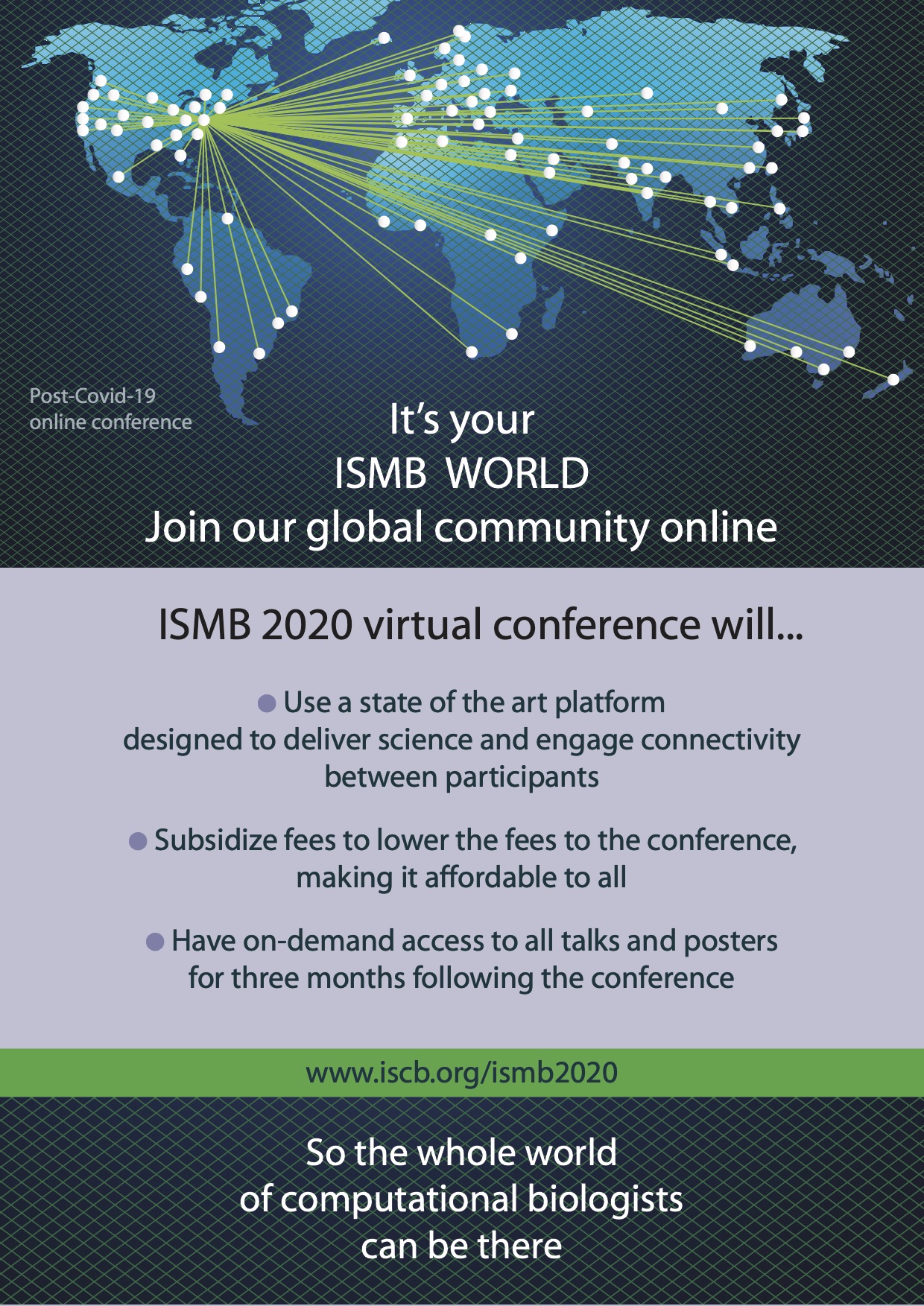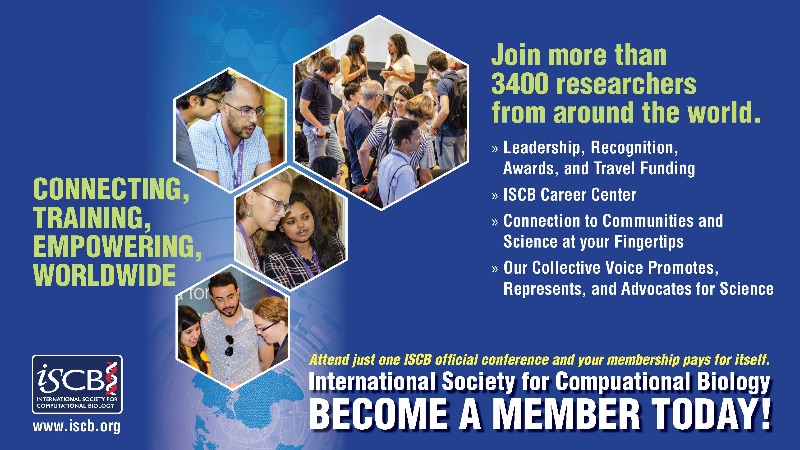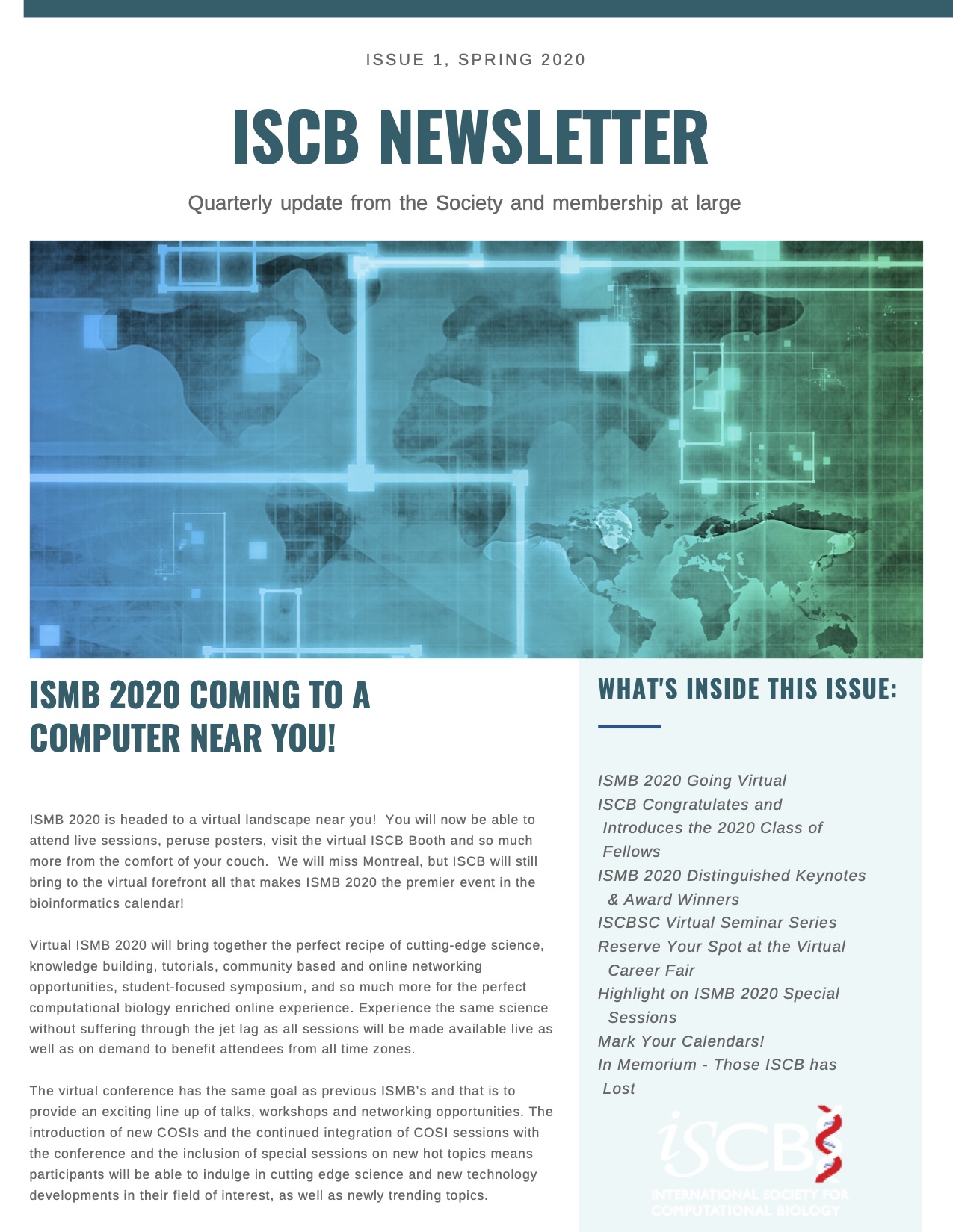 |
|||||||||||||||||||||||||||||
| ISMB 2020 Open Call for COVID-19 Abstracts and Late Posters Call for SARS-Cov-2/COVID-19 Abstracts! NEW for 2020 Deadline: May 14, 2020 We invite abstracts for research that is topical to the current SARS-Cov-2 / COVID-19 pandemic for consideration for presentation during the ISMB 2020 conference. |
|||||||||||||||||||||||||||||
| Call for Late Posters Deadline: May 28, 2020 Open call for late posters. Submit your research today. Each accepted poster presenter will have their poster along with a recording of their presentation as part of the conference Poster Hall. The Poster Hall will be open throughout the duration of the conference. Scheduled poster presentations times will allow the author to interact with the participants. |
|||||||||||||||||||||||||||||
 Join us for the Join us for the ISMB 2020 Virtual Conference Registration is now open at: https://www.iscb.org/cms_addon/registration_conference/ismb2020virtual |
|||||||||||||||||||||||||||||
| ISMB 2020 Fellowship Award Program ISMB 2020 Fellowship Program is now accepting applicants. If you are unable to afford the participation fee for ISMB 2020 and hold an active ISCB membership, you can submit for a fellowship award that will cover the cost of the registration fees. With these unprecedented times, we will be opening up these awards to anyone who is an active ISCB member with priority going to members in low-income countries and students and postdoctoral fellows. |
|||||||||||||||||||||||||||||
 |
|||||||||||||||||||||||||||||
| Call for Papers: Publish your software tools in the ISCB Community Journal Did you know you can publish an article describing new software tools you have created? Software tool articles cover all aspects of your software, from details of the code used and examples of data inputs, to tips for other researchers on maximizing the tool’s potential. Benefit from proper code syntax highlighting, interactive figures, Code Ocean capsules, and indexing through Scopus and PubMed to increase the visibility of your research. Find out more here and submit today to the ISCB Community Journal on F1000Research. |
|||||||||||||||||||||||||||||
 |
|||||||||||||||||||||||||||||
| In conjunction with the communities of special interest (COSIs), select presentations are invited to give a live-streamed talk about their research. Access to the webinar series is complimentary for ISCB members. Nonmember can join for a fee. Mark your calendar for these upcoming webinars. | |||||||||||||||||||||||||||||
| Submit your nomination for an ISCB Officer! ISCB Officer Nominations Deadline: May 31, 2020 The International Society for Computational Biology (ISCB) is encouraging members to submit nominations for the Society’s leadership - open Officer positions. Nominations are submitted at www.iscb.org/nominate (you must login to your membership record to access the nomination form). Self-nominations will not be accepted. |
|||||||||||||||||||||||||||||
| ISCB Art in Science Award As part of the virtual ISMB 2020, the ISCB Art in Science Competition is a way to show the beauty of science in art form, especially topics related to Computational and Molecular Biology. All interested members may submit images that have been generated as part of a research project and other creative efforts that involve scientific concepts or employ scientific tools and methods. Find the beauty of science through art! - Submit your artwork. |
|||||||||||||||||||||||||||||
| 2019/2020 ISCB Wikipedia Competition Submissions Deadline: May 15, 2020 The International Society for Computational Biology (ISCB) and the Computational Biology taskforce of WikiProject Molecular Biology announce the 9th ISCB Wikipedia Competition: the competition aims to improve the coverage on Wikipedia of any aspect of computational biology. The competition is open to students and trainees at any level either as individuals or as groups. |
|||||||||||||||||||||||||||||
| Don't Miss! Important Deadlines below! | |||||||||||||||||||||||||||||
 |
Workshops deadline: May 25, 2020 Abstracts deadline: August 24, 2020 |
||||||||||||||||||||||||||||
| - - - - - - - - - - - - - - - - - - - - - - - - - - - - - - - - - - - - - - - - - - - - - - - - - - - - - - - - - - - - - - - | |||||||||||||||||||||||||||||
 |
May 19, 2020 at 11:00AM EDT May 26 at 11:00AM EDT June 12, 2020 at 11:00AM EDT |
||||||||||||||||||||||||||||
| - - - - - - - - - - - - - - - - - - - - - - - - - - - - - - - - - - - - - - - - - - - - - - - - - - - - - - - - - - - - - - - | |||||||||||||||||||||||||||||
 |
SAVE THE DATE! November 16 - 18, 2020 |
||||||||||||||||||||||||||||
| - - - - - - - - - - - - - - - - - - - - - - - - - - - - - - - - - - - - - - - - - - - - - - - - - - - - - - - - - - - - - - - | |||||||||||||||||||||||||||||
 |
SAVE THE DATE! December 03 - 05, 2020 |
||||||||||||||||||||||||||||
| - - - - - - - - - - - - - - - - - - - - - - - - - - - - - - - - - - - - - - - - - - - - - - - - - - - - - - - - - - - - - - - | |||||||||||||||||||||||||||||
 |
SAVE THE DATE! December 09 - 11, 2020 |
||||||||||||||||||||||||||||
| ISCB Career Center ISCB Career Center – the place to post a job, search for a job, or upload your CV. Job posting and CV upload is complimentary for members. Nonmember may also participate for a nominal fee. |
|||||||||||||||||||||||||||||
| Members Corner |
|||||||||||||||||||||||||||||
 |
|||||||||||||||||||||||||||||
|
|||||||||||||||||||||||||||||










